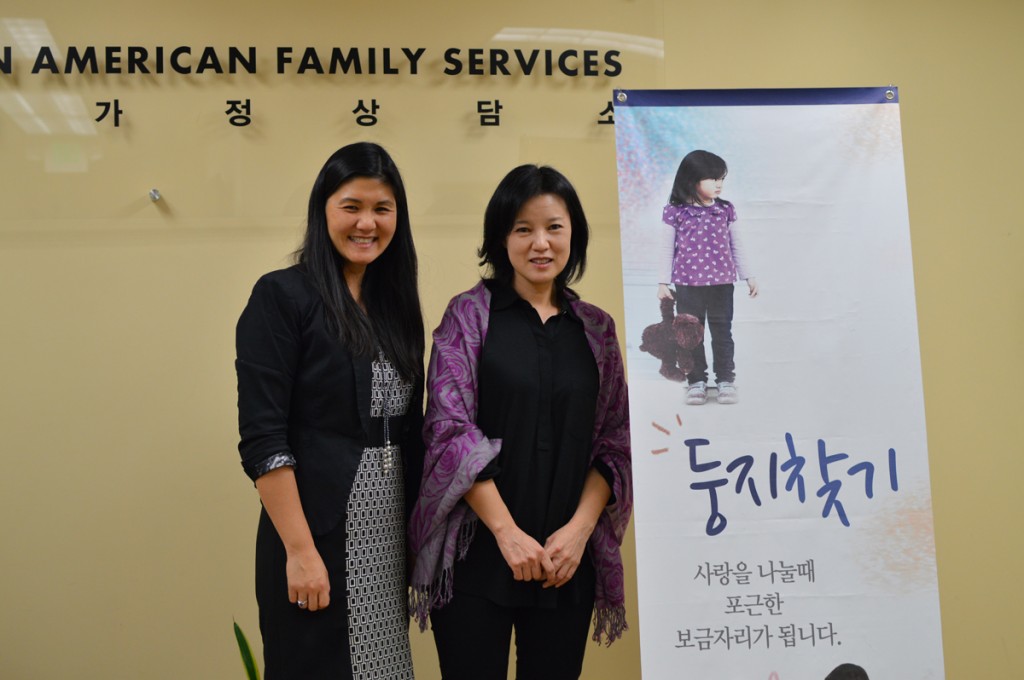- California Assembly OKs highest minimum wage in nation
- S. Korea unveils first graphic cigarette warnings
- US joins with South Korea, Japan in bid to deter North Korea
- LPGA golfer Chun In-gee finally back in action
- S. Korea won’t be top seed in final World Cup qualification round
- US men’s soccer misses 2nd straight Olympics
- US back on track in qualifying with 4-0 win over Guatemala
- High-intensity workout injuries spawn cottage industry
- CDC expands range of Zika mosquitoes into parts of Northeast
- Who knew? ‘The Walking Dead’ is helping families connect
Early success in foster family initiative shows Korean community has plenty of heart

Korean American Family Services Executive Director Connie Chung Joe, left, and Korean Foster Family Initiative Project Manager Estee Song. (Tae Hong/The Korea Times)
By Tae Hong
Koreans like to say that blood is thicker than water. The age-old saying, however, hasn’t stopped the Los Angeles Korean American community from joining in on providing homes for foster children.
Almost a year out from its January launch, the picture emerging from the Korean Foster Family Initiative (KFFI) is that of a concerted effort by a conscious community.
It’s created 16 graduates of PS-MAPP, a 33-week-long training program for potential foster or adoptive parents required for certification. A total of nine families made it through the first round of recruitment — four have already received their licenses, and five are waiting.
“I really believe the whole community worked this project together,” said Estee Song, project manager. “It was successful because we did it as a community, as a Korean American project.”
The program is the first step taken by Los Angeles Korean Americans in providing culturally relevant homes — in terms of language, food, customs — to children under the county’s crowded foster system.
Jointly launched by Los Angeles County’s Department of Children and Family Services and Korean American Family Services (KFAM), KFFI offers Korean-language information sessions and training to the dedicated few who make it through the 33-week parenting education course, interviews and background checks.
Christina Park, one of the program’s first 16 graduates, was among the first to receive a foster home license.
Park is a first-generation Korean immigrant who arrived in the U.S. in the late 1980s. Her husband, Se-hong Park, is a shop owner, and she’s a stay-at-home mom whose kids — one a married college graduate in New York, one soon to follow in graduation — are now grown-ups.
Restlessness had crept onto her when her husband came across a newspaper ad about the foster initiative. The couple, both in their mid-50s, had never before considered fostering children.
“We had no plans of being a foster home in the past. It was hard enough raising two kids. But now that they’re gone, their rooms are sitting empty in our home,” Christina Park said. “When we saw the ad, it occurred to us that this might be a good thing to do.”
According to DCFS Supervising Children’s Social Worker Julie Haw-Lee, one of two from the department who oversaw training, the group of potential Korean American foster parents who came out to participate in the program were unusually enthusiastic.
“Their level of motivation and commitment — they saw it as something they felt they needed to do,” Haw-Lee, whose work with the DCFS started in 1987, said. “To me, someone who’s been doing this a while, that was very refreshing.”
The Parks attended training sessions every Saturday for 33 weeks with a handful of other families. The couple entered the program with the simple idea that they would take care of the foster children as though they were their own. They came out of it with a new perspective on responsibility and potential obstacles they might face along the way.
Children in the Los Angeles County foster system numbered more than 36,600 as of the end of November, according to DCFS.
Some were abandoned, others neglected or abused.
After detainment by authorities, children enter the care of the department while their biological parents undergo counseling and education. The need for good homes is a pressing one — surveys have shown that 70 percent of inmates at California prisons are former foster youth.
“The social workers will always ask us, ‘Do you have any foster homes that are Korean-speaking or Asian homes? Because the children are not doing too well,’” Song, who is a former foster children counselor, said. “They need to be culturally relevant. Sometimes [children] don’t speak English fluently and need Korean homes right away.”
KFFI’s goal isn’t only to serve children — it’s also to serve foster parents and biological parents who often are not proficient in English. The goal is to help everyone so families can be restored, and in cases of failed reunification, mentally healthier children, Song said.
“We want foster parents to be able to help [children who have been taken away from their biological parents],” Song said. “This is a very, very traumatic experience for children. We want foster parents to help them heal and make them more comfortable so they can be restored.”
Three months ago, more than half a year into the initiative, the Parks received their license as a foster home.
All that is left is for a foster child to come through their front door.
Blood may be thicker than water — that much still holds true for her, Christina Park said — but taking in children is the least she can do as an older parent who is not looking to adopt but wants to help.
“There are children who are going through these hardships — Korean children. I thought it would be good to help them,” she said.
“People said Koreans would help but that they wouldn’t take in other people’s children,” Song said. “They said it wasn’t going to work. But the one thing I knew was that Korean people have affinity, something that I think represents Koreans. I knew there were going to be people who were going to come forward.”
The seeds of KFFI have been planted for as long as DCFS has referred detained children and parents in need of counseling and education to KFAM, a non-profit Koreatown institution that has been around since 1983.
The agency was aware of the lack of bilingual and bi-cultural foster homes for Korean foster kids, an issue that eventually made it into local Korean-language newspapers around town two years ago, said Connie Chung Joe, KFAM executive director.
Other Korean American community leaders agreed there was a need for awareness and recruitment. Traumatized children — Korean children, some of them abused and neglected — needed proper care and comfort.
Eventually, KFAM took leadership, holding the first press conference on the initiative in January 2014 with news of a series of information sessions and the training program — to be offered in Korean for the first time — as well as a hotline.
Organizers’ doubts and concerns going into the initiative ranged from lack of community interest to Koreans’ culturally blood-is-thicker-than-water mindsets.
“Koreans have a strong affinity to blood relationship, and there’s often a stigma for adoptees. We didn’t know if that would be an issue for our foster kids, that families wouldn’t feel that strong affinity because they’re not blood relations,” Joe said.
Annette Hwangbo, a DCFS social worker who led the project alongside Haw-Lee and Song, said one of their biggest concerns was the task of convincing Korean Americans that becoming licensed foster homes was a plausible, doable thing with the right level of commitment.
They needn’t have worried — 535 Korean Americans showed up to the handful of information sessions held inside Korean churches in and around the Los Angeles area. An estimated 470 called into the hotline asking questions.
The group was carefully weeded down to 16, but that nine families completed such a time-intensive process in less than a year is rare, Haw-Lee said.
“[The reaction] surpassed, beyond my expectations,” she said. “I actually did not think anybody would follow through the process.”
“The pace at which we have moved is just remarkable,” Hwangbo said.
Hwangbo said the initiative’s success in response, recruitment and retainment will encourage department authorities to invest more time and resources into similar projects.
Joe agreed. The early success of KFFI in its first year has opened hopes that the same idea can be applied to foster children of other Asian Pacific Islander ethnicities, including significant numbers of Japanese and Cambodian children in the county’s foster system.
Applications are open for anyone interested in going through the foster care program, which begins with information sessions and continues with orientation, background checks, PS-MAPP training courses and interviews.
“It’s tremendously gratifying for us to know that we have, in our community, such warmth toward helping foster children,” Joe said. “This is just the beginning.”
















